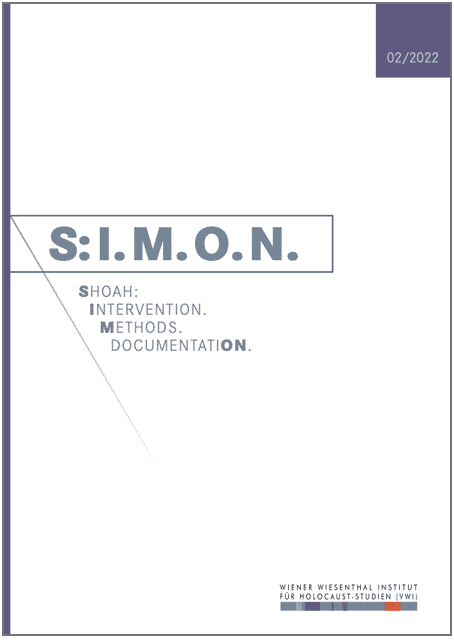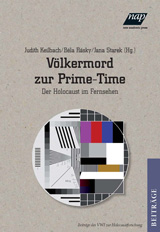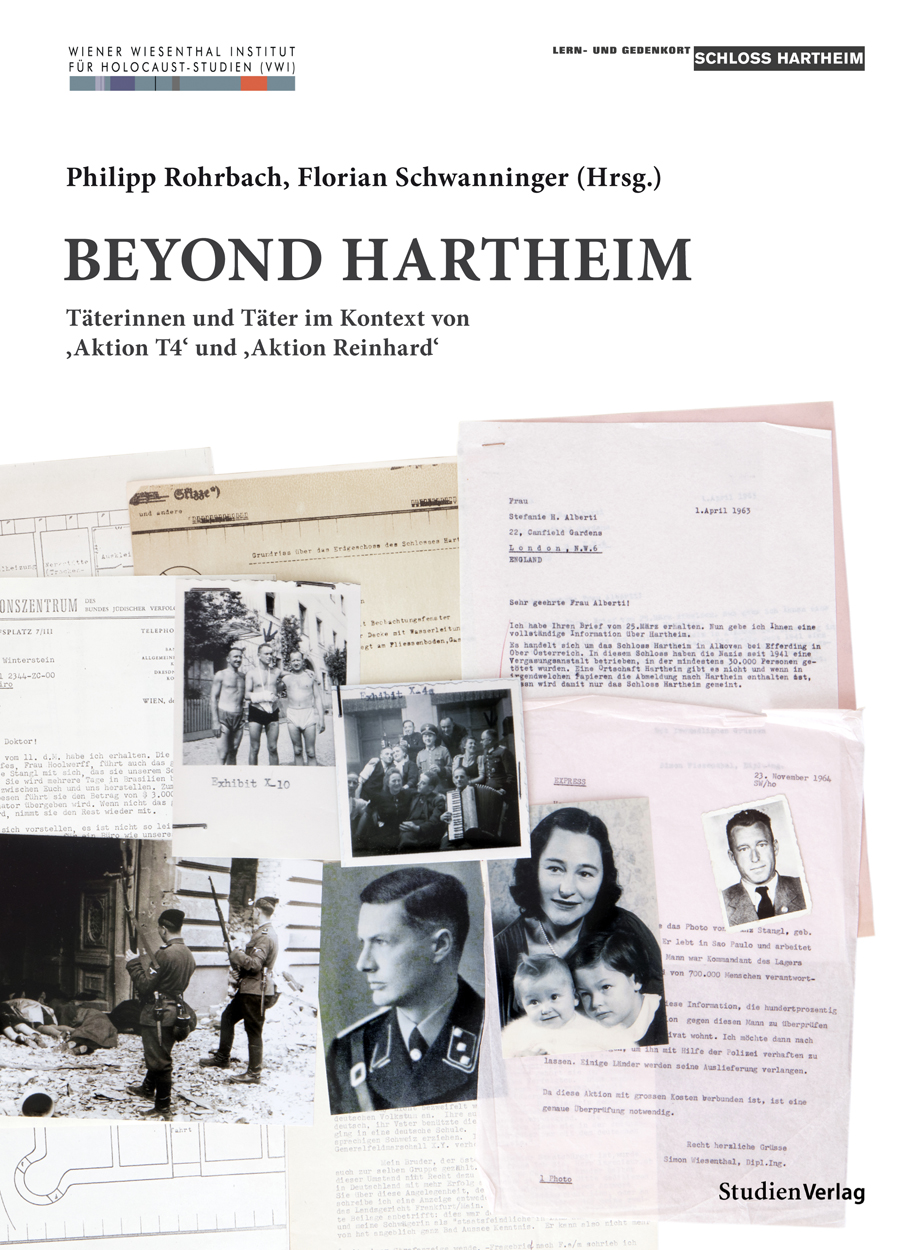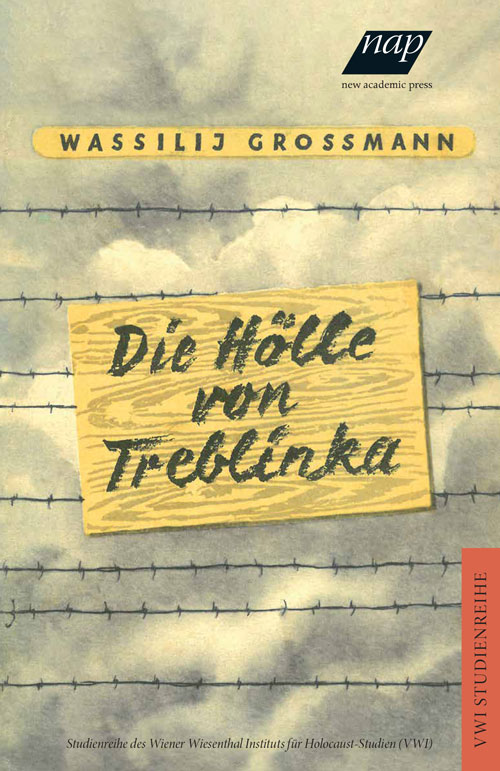News – Events – Calls
| 02. May 2024 18:30 Simon Wiesenthal LectureEdyta Gawron: Never Too Late to Remember, Never Too Late for Justice! Holocaust Research and Commemoration in Contemporary PolandIn 1994, Simon Wiesenthal received a doctorate honoris causa from the Jagiellonian University in Krakow for his lifelong quest for justice – half a century after he had been, for a short time, prisoner of the local Nazi Concentration Camp (KL) Plaszow. The 1990s were the decade when t...Weiterlesen... |
| 07. May 2024 00:00 - 04. June 2024 00:00 WorkshopDealing with Antisemitism in the Past and Present. Scientific Organisations and the State of Research in AustriaThis series of talks, presented by antisemitism experts from different organisations that research antisemitism using a variety of academic approaches, aims to provide a snapshot of historical evolutions, current events, prevalent perceptions and declared (and undeclared) attitudes. I...Weiterlesen... |
| 14. May 2024 08:45 - 16. May 2024 16:30 TagungQuantifying the Holocaust. Classifying, Counting, Modeling: What Contribution to Holocaust History? About the conference: https://quantiholocaust.sciencesconf.org/ Programme timed on the basis of 15-minute presentations + 15-minute discussions; short breaks and lunches Day 1 Tuesday, 14 May 2024Centre Malher (9 rue Malher 75004 Paris/amphi Dupuis) From 8.45 am: Welcome9.30 am...Weiterlesen... |
| 24. May 2024 18:00 InterventionLange Nacht der Forschung 20242024 öffnet das Wiener Wiesenthal Institut für Holocaust-Studien (VWI) in der Langen Nacht der Forschung wieder seine Tore und lädt Interessierte in seine Räumlichkeiten am Rabensteig 3 ein. Im Rahmen von Vorträgen, Podiumsdiskussionen und Präsentationen bieten VWI-Team und Gäste Einb...Weiterlesen... |
| 04. June 2024 13:00 VWI invites/goes to...Workshop: Social History of the Shoah. Everyday Life, Space and Time VWI invites the Department of Contemporary History, University of Vienna 13:00Hannah Riedler (VWI Junior Fellow)Between Deportation, Forced Labour and Germanisation. The Umwandererzentralstelle in Occupied Poland 1939–1941Commented by Kerstin von Lingen 13:40...Weiterlesen... |
| 13. June 2024 18:30 Simon Wiesenthal LectureJack Fairweather: The Trials of Fritz Bauer. How Life as a Gay Jewish Socialist under the Nazis Shaped His Quest for JusticeFritz Bauer’s daring mission to bring Adolf Eichmann and the perpetrators of Auschwitz to justice forced Germany and the world to pay attention to the crimes of the Holocaust. Bauer’s moral courage in speaking out in a society that had not yet come to terms with its past, which he him...Weiterlesen... |
Fortunoff Research Fellowship for Study of Roma and Sinti Persecution 2023/24 at the Vienna Wiesenthal Institute for Holocaust Studies (VWI)
The Vienna Wiesenthal Institute for Holocaust Studies (VWI) and the Fortunoff Archive at Yale University invite applications for its research fellowship for the period of two years, between October 2023 to September 2025.
The VWI is an academic institution dedicated to the study and documentation of antisemitism, racism, nationalism, and the Holocaust. Conceived and established during Simon Wiesenthal’s lifetime, the VWI receives funding from the Austrian Ministry of Education, Science, and Research as well as the City of Vienna. Research at the institute focuses on the Holocaust in its European context, including its antecedents and its aftermath.
The Fortunoff Video Archive is a collection within the Manuscripts and Archives Department of Sterling Memorial Library at Yale University. The Archive, which began as a grassroots effort in New Haven to record on video the testimonies of survivors, witnesses, and bystanders in 1979, currently holds more than 4,400 testimonies comprising over 10,000 hours of moving image materials. These testimonies were produced with the cooperation of 37 affiliate projects working in over a dozen countries and just as many languages. The archive is still recording testimony today at Yale University. The Fortunoff Archive is a unique collection that has served as an important resource for scholarship in a wide range of disciplines for more than three decades. The collection includes a significant number of Sinti and Roma testimonies in several languages, primarily German and Slovak. This fellowship is designed to encourage scholarly use of those materials.
Scholars who have completed their PhD studies and have produced works of scholarship are eligible for receiving a research fellowship. The Fortunoff Research Fellow will be able to conduct research on a topic of their choice related to Roma and Sinti persecution during the Porrajmos/Holocaust at the VWI using the digital collection of the Fortunoff Archive in Vienna. Beyond the research work itself, the stay at the institute is intended to encourage communication and scientific exchange among the fellows at the institute. The Fortunoff Research Fellow is expected to support the institute’s academic work and provide research adjective and support to junior fellows. The Fortunoff Research Fellow must be regularly present at the VWI. Fortunoff Research Fellow will also participate in projects related to the Sinti and Roma materials included in the Fortunoff Archive, including the organization of events related to the collection, cooperating with the archive partners who recorded the original materials, improvement of collection metadata, and other activities as assigned.
Research projects are to focus on a topic relevant to the research interests on oral history of the Porrajmos with special focus on the collections of the Fortunoff Archive. Within this parameter, applicants are free to choose their own topic, approach and methodology. The Fortunoff Research Fellow will also have access to the archives of the VWI. It is expected that the fellow will make use of relevant resources from the collection in their research projects. Research results will be the subject of formal fellow’s discussion and will be presented to the wider public at regular intervals. At the end of their stay, the fellow is required to submit a research paper which will be peer-reviewed and published in the institute’s e-journal S:I.M.O.N. – Shoah: Intervention. Methods. Documentation. He/She will develop a deep overview and analysis of the subcollection of Roma testimonies in the Fortunoff Archive.
The Fortunoff Research fellowship is awarded for a duration of 24 months. He or she will have and Internet access and will receive a monthly stipend of € 2,200. In addition, VWI will cover housing costs during the fellowship (up to € 700) as well as the costs of a round-trip to and from Vienna (coach class airfare or 2nd class train fare). There is an additional one-off payment of € 500 available for research conducted outside of Vienna or photocopying costs outside of the institute, where applicable.
The Fortunoff Research fellow will be selected by the International Academic Advisory Board of the VWI and of the Fortunoff Archive.
Applications may be submitted in English and must include the following documents. Preference will be given to Roma and Sinti applicants:
- completed application form,
- a detailed description of the research project, including the research objectives, an overview of existing research on the topic and methodology (12,000- character max.)
- a list of publications and a CV with a photo, if not already included in application form (optional).
Please send your application in electronic format (in one integral *.pdf-file) with the subject header “Fortunoff Research Fellowship for Study of Roma and Sinti Persecution 2023/25” by 13 January 2023 to: This email address is being protected from spambots. You need JavaScript enabled to view it..
If you do not get confirmation that we have received your proposal, please contact us.
Christoph Dieckmann
Fortunoff Research Fellow (09/2022 – 02/2023)
Shoah, Warfare and Occupation 1938-1945
 Historians have long studied the complex, close relationship between the Holocaust and the German war effort. Using Lithuania as an example, Dieckmann takes a new look at this relationship that also includes German occupation policy. In doing so, he provides a more plausible explanation for the development of Germany's murderous policies in Lithuania. Through the intertwined analysis of warfare, occupation policy and the Shoah and the integration of central as well as local perspectives, his conceptual approach can possibly be transferred to other countries and regions. Using hitherto little-studied German sources, he shows how the inner logic of German policy led to mass crimes in 1941. Dieckmann plans to use his time as Fortunoff Senior Fellow at the VWI to expand his analysis of the Holocaust in Lithuania by integrating relevant testimonies from the Fortunoff Video Archive.
Historians have long studied the complex, close relationship between the Holocaust and the German war effort. Using Lithuania as an example, Dieckmann takes a new look at this relationship that also includes German occupation policy. In doing so, he provides a more plausible explanation for the development of Germany's murderous policies in Lithuania. Through the intertwined analysis of warfare, occupation policy and the Shoah and the integration of central as well as local perspectives, his conceptual approach can possibly be transferred to other countries and regions. Using hitherto little-studied German sources, he shows how the inner logic of German policy led to mass crimes in 1941. Dieckmann plans to use his time as Fortunoff Senior Fellow at the VWI to expand his analysis of the Holocaust in Lithuania by integrating relevant testimonies from the Fortunoff Video Archive.
Christoph Dieckmannteaches at the University of Haifa in the Weiss-Livnat International Program of Holocaust Studies. His study ’German Occupation Policy in Lithuania 1941-1944’ was awarded the Yad Vashem International Book Prize for Holocaust Research in 2012. The English translation of this will be revised as part of the fellowship. He co-edited Der Dienstkalender Heinrich Himmler 1941/42 (1999).
E-Mail: This email address is being protected from spambots. You need JavaScript enabled to view it.
Anca Filipovici
Fortunoff Research Fellow (10/2022 – 06/2023)
Personal Accounts of Resistance. Jewish Youngsters in Underground Organizations During the Holocaust in Romania
 The project explores the history of the Holocaust in Romania from the perspective of Jewish youth as an agency of resistance. It focuses on Jewish underground youth organisations and other political movements that were active during the Second World War. A focus is placed on young Romanian Jews outside the ghettos, but also on those who were deported to Transnistria; on those who considered the possibility of a new life in Romania or fought for emigration to Eretz Israel. Based on archival files and survivors' testimonies from the Fortunoff Video Archive, the project will create a typology of these organisations. It will examine the mobilising factors and analyse the relationship between youth and political engagement. It raises the question of the nature of ethnic and religious identity when this identity transforms the individual into a victim.
The project explores the history of the Holocaust in Romania from the perspective of Jewish youth as an agency of resistance. It focuses on Jewish underground youth organisations and other political movements that were active during the Second World War. A focus is placed on young Romanian Jews outside the ghettos, but also on those who were deported to Transnistria; on those who considered the possibility of a new life in Romania or fought for emigration to Eretz Israel. Based on archival files and survivors' testimonies from the Fortunoff Video Archive, the project will create a typology of these organisations. It will examine the mobilising factors and analyse the relationship between youth and political engagement. It raises the question of the nature of ethnic and religious identity when this identity transforms the individual into a victim.
Anca Filipovici, research associate at the Romanian Institute for Research on National Minorities in Cluj-Napoca, Romania. Author of numerous articles and studies dealing with nationalism and ethnicity, the history of youth, and education and anti-Semitism in secondary and higher education.
E-Mail: This email address is being protected from spambots. You need JavaScript enabled to view it.
Julie Dawson
Fortunoff-VWI Fellow (10/2020 – 5/2021)
The Legacy of Trauma. Examining the “Crisis of Life” in Jewish Survivor Diaries of Early Postwar Romania
 In 2009, a series of four diaries was discovered in an abandoned synagogue in a small Transylvanian town. Containing over 800 entries, the pages stretch from 1948 to 1961 and record the postwar life of grief and the limited triumph of a young survivor of the Transnistrian Holocaust. The diaries of Blanka Lebzelter are a remarkable record of the quotidian struggles that impoverished survivors faced in the aftermath of devastation and a tremendous tool, providing multifaceted entry points for examining the experience of Jewish survivors in Romania after the war as well as for analysing manifestations of trauma in everyday life. This project examines the diaries from multiple perspectives: as a singular testimony, representing survivor narratives that have been little probed, and as a source allowing hitherto unexplored insights into social and cultural history considerations of postwar Romania. My research during the fellowship period is focussed on understanding the role of trauma in Lebzelter’s life, both in terms of the primary moments of traumatic encounter, as gathered through archival evidence and oral history narratives, and the reiterations of trauma, as expressed in her diary, in the postwar years.
In 2009, a series of four diaries was discovered in an abandoned synagogue in a small Transylvanian town. Containing over 800 entries, the pages stretch from 1948 to 1961 and record the postwar life of grief and the limited triumph of a young survivor of the Transnistrian Holocaust. The diaries of Blanka Lebzelter are a remarkable record of the quotidian struggles that impoverished survivors faced in the aftermath of devastation and a tremendous tool, providing multifaceted entry points for examining the experience of Jewish survivors in Romania after the war as well as for analysing manifestations of trauma in everyday life. This project examines the diaries from multiple perspectives: as a singular testimony, representing survivor narratives that have been little probed, and as a source allowing hitherto unexplored insights into social and cultural history considerations of postwar Romania. My research during the fellowship period is focussed on understanding the role of trauma in Lebzelter’s life, both in terms of the primary moments of traumatic encounter, as gathered through archival evidence and oral history narratives, and the reiterations of trauma, as expressed in her diary, in the postwar years.
Julie Dawson is a doctoral candidate at the Institute for Contemporary History at Vienna University. She holds degrees from Columbia University and Northwestern University. Dawson worked for the Leo Baeck Institute from 2010 to 2019, directing their archival survey of Transylvania and Bukovina (jbat.lbi.org) from 2012 to 2019. From 2016 to 2019, she was a researcher-in-residence in Mediaș (Romania) for the EU Horizon 2020 project TRACES: Transmitting Contentious Cultural Heritages with the Arts. Her research interests include Bukovina, communist Romania, women’s history, trauma, and memory studies.
E-Mail: This email address is being protected from spambots. You need JavaScript enabled to view it.
Aleksandra Szczepan
Fortunoff Fellow (10/2021-08/2022)
Situated Witnessing: Maps as a Tool of Memory in Holocaust Video Testimony
 The project explores the significance of the map as a form of Holocaust testimony in the context of video testimony. Its main premise is that Holocaust maps – namely, maps created, used or referred to by Shoah witnesses in the act of bearing witness – are much more than mere visual representations of a given space. They might serve as evidence, as a way of referring to and imagining the past, a tool for memory, an intimate medium of experience, and alternative testimonies. The project aims at a thorough analysis of maps used by the witnesses recorded for the Fortunoff Video Archive in the process of giving testimony, or referred to during the interviews, as well as objects, gestures, narrative tools and language expressions that serve as maps, i.e. situate the testimonies and navigate the witnesses through the space of the Shoah.
The project explores the significance of the map as a form of Holocaust testimony in the context of video testimony. Its main premise is that Holocaust maps – namely, maps created, used or referred to by Shoah witnesses in the act of bearing witness – are much more than mere visual representations of a given space. They might serve as evidence, as a way of referring to and imagining the past, a tool for memory, an intimate medium of experience, and alternative testimonies. The project aims at a thorough analysis of maps used by the witnesses recorded for the Fortunoff Video Archive in the process of giving testimony, or referred to during the interviews, as well as objects, gestures, narrative tools and language expressions that serve as maps, i.e. situate the testimonies and navigate the witnesses through the space of the Shoah.
Aleksandra Szczepan is a co-founder and member of the Research Centre for Memory Cultures at the Jagiellonian University in Kraków and a collaborator of the United States Holocaust Memorial Museum carrying out oral history projects in Poland and Spain. She authored the book Realista Robbe-Grillet (2015) on 20th-century redefinitions of realism. She has been recipient of scholarships from the USHMM, EHRI, the Polish National Science Centre and the Polish Ministry of Culture and National Heritage. Her research interests include Holocaust memory, decoloniality in the perspective of Eastern-Central Europe, oral history and space-based testimonial practices of witnesses to the Shoah.
E-Mail: This email address is being protected from spambots. You need JavaScript enabled to view it.
Ion Popa
Fortunoff Research Fellowship (02/2019–09/2019)
Conversion and Identity. Experiences of Jews who Converted to Christianity Before and During the Holocaust
 Research into the attitude of churches towards Jews during the Holocaust, which has grown steadily in the last ten years, has shown the extent of Jews’ conversions as a way of avoiding persecution and death in countries such as France, Poland, Belgium, Hungary, and Romania. In Romania, for example, the country with the third-largest Jewish community before the Holocaust, a 1942 census revealed that 4631 out of 272,573 Jews were converts to Christianity. Moreover, despite a March 1941 ban on conversions, at least 2008 Jews converted from 1941 to 1943, most of them to Catholicism. In France, Belgium, the Netherlands, and Poland the practice was used by both Catholic and Protestant local churches. Conversions in Catholic countries were often engulfed in controversies, as Jewish children who took shelter in monasteries or Catholic households were forcefully converted. During the Hungarian crisis of 1944, false baptismal certificates were issued as a way of helping Jews threatened with deportation. Although we now know more about the attitude of churches towards conversion and converted Jews, we still lack basic knowledge about the reaction of Jewish religious authorities on this matter and about converts’ experiences during the Holocaust. This is in part due to a lack of available post-war testimonies of Holocaust survivors who converted to Christianity. From this point of view, the Fortunoff Archive is an excellent source of documentation, as it contains over 70 testimonies of such Jews. A closer examination of these testimonies will answer some of the most stringent questions about this forgotten category of Holocaust survivors such as: How were Jewish converts treated by the Jewish community and by the Christian churches during the Holocaust? What were the identity dilemmas they faced during this period? Could they return back to Judaism and, if so, under what circumstances? The project will survey, synthesise, and compare all the relevant testimonies from the Fortunoff Archive according to this set of research questions and main objectives. It aims to identify reasons why Jews chose to convert to Christianity during the Holocaust, and place them in the context of other strategies of survival. It will also examine the identity dilemmas these people faced and provide a glance into their post-Holocaust fate. The project will result in the publication of two articles.
Research into the attitude of churches towards Jews during the Holocaust, which has grown steadily in the last ten years, has shown the extent of Jews’ conversions as a way of avoiding persecution and death in countries such as France, Poland, Belgium, Hungary, and Romania. In Romania, for example, the country with the third-largest Jewish community before the Holocaust, a 1942 census revealed that 4631 out of 272,573 Jews were converts to Christianity. Moreover, despite a March 1941 ban on conversions, at least 2008 Jews converted from 1941 to 1943, most of them to Catholicism. In France, Belgium, the Netherlands, and Poland the practice was used by both Catholic and Protestant local churches. Conversions in Catholic countries were often engulfed in controversies, as Jewish children who took shelter in monasteries or Catholic households were forcefully converted. During the Hungarian crisis of 1944, false baptismal certificates were issued as a way of helping Jews threatened with deportation. Although we now know more about the attitude of churches towards conversion and converted Jews, we still lack basic knowledge about the reaction of Jewish religious authorities on this matter and about converts’ experiences during the Holocaust. This is in part due to a lack of available post-war testimonies of Holocaust survivors who converted to Christianity. From this point of view, the Fortunoff Archive is an excellent source of documentation, as it contains over 70 testimonies of such Jews. A closer examination of these testimonies will answer some of the most stringent questions about this forgotten category of Holocaust survivors such as: How were Jewish converts treated by the Jewish community and by the Christian churches during the Holocaust? What were the identity dilemmas they faced during this period? Could they return back to Judaism and, if so, under what circumstances? The project will survey, synthesise, and compare all the relevant testimonies from the Fortunoff Archive according to this set of research questions and main objectives. It aims to identify reasons why Jews chose to convert to Christianity during the Holocaust, and place them in the context of other strategies of survival. It will also examine the identity dilemmas these people faced and provide a glance into their post-Holocaust fate. The project will result in the publication of two articles.
Ion Popa is a Saul Kagan Claims Conference Postdoctoral Fellow in Advanced Shoah Studies (New York) and Honorary Research Fellow of the Centre for Jewish Studies, University of Manchester. His research focus lies in the field of Jewish-Christian Relations in Eastern Europe during the Holocaust. His numerous publications include the monograph The Romanian Orthodox Church and the Holocaust and the article The 7th Rosiori Regiment and the Holocaust in Romania and the Soviet Union, the latter published in Dapim. Studies on the Holocaust in 2018.











